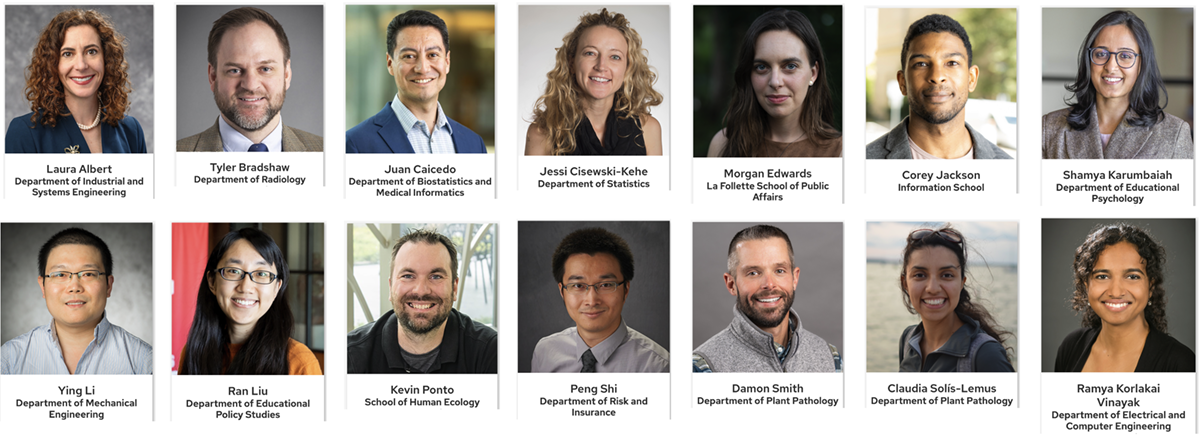|
|
Data Science Updates is the University of Wisconsin-Madison's resource for news, training, events, and professional opportunities in data science, brought to you by the Data Science Institute, powered by American Family Insurance, and the Data Science Hub.
April 17, 2024
|
|
|
|

|
Participate in the Open Source Survey
The Open Source Program Office (OSPO) is conducting a survey to understand how open source is utilized and regarded, and its impact on academics and research at UW-Madison. The survey should take no more than 10 minutes, and your responses will help improve understanding of the open-source landscape at UW-Madison and guide future endeavors in this field. Please complete the survey by Friday, May 3, 2024, and thank you for taking the time to participate. Should you have any questions or require further information, please do not hesitate to contact ospo@datascience.wisc.edu.
|

|
Data Science Institute Welcomes New Affiliates
The Data Science Institute recently welcomed 14 new faculty to their group of DSI Affiliates, bringing the total number of affiliates to 55. DSI Affiliates are UW–Madison faculty and academic staff from across campus who are actively engaged in foundational or use-inspired research, aligned with the DSI mission and vision, that is relevant to data science. DSI Affiliate appointments are renewable, three-year terms, and the next application window will open in the fall. For more information, check out the DSI Affiliates page on the Data Science @ UW website.
|
Data Science Hub and Institute Thank our Student Workers
This week is National Student Employment Week, and we are taking a moment to recognize the student employees who contribute their time and talent to the Data Science Hub and Data Science Institute: Cole Navin, Emma Mayhew, and Reed Lokken. These students work behind the scenes on our workshops and events, websites, office tasks, and other efforts that help connect the community with data science at UW–Madison. In particular, they are instrumental in bringing this newsletter to your inbox every two weeks. Thank you, Emma, Cole and Reed, for your exceptional work!
|
UW-Madison Open Source Program Office Survey
UW-Madison’s new Open Source Program Office (OSPO) is seeking insights from the campus community as they strive to understand how open source is utilized, regarded, and its impact on academics and research at UW-Madison. Survey responses will help OSPO improve their understanding of the open source landscape at UW-Madison and guide their future endeavors in this field.
The survey should take no more than 10 minutes to complete. Feedback will directly contribute to the enhancement of open source initiatives and resources.
OSPO asks that participants complete the survey by Friday, May 3, 2024, to ensure their input is included in OSPO's analysis.
|
|
|
|
Talk and Hands-on Workshop: Novel Software Tool for Bioinformatics Analysis
April 23, 1:30 - 2:30 p.m., UW Biotechnology Center Auditorium, Biotech Talk
The UW-Madison Biotechnology Center is delighted to present the Qlucore Omics Explorer software with a talk and hands on workshop. The basic concept behind the Qlucore software is to provide a tool which can take full advantage of the most powerful pattern recognizer that exists - the human brain. The result is a core software engine that visualizes the data in 3D to help the user identify hidden structures and patterns.
Qlucore is a Graphical User Interface-based application for analyzing multiple types of omics datasets, particularly suitable for researchers lacking experience with Linux, R, or Python. Qlucore can help you analyze transcriptomic, lipidomic, proteomic, or other omic datasets easily, relying on your own expertise in the studied biological system.
The software is a fast, visualization-based solution that allows users to see real-time differences based on built-in expert statistics without having to consult a biostatistician. The visual analysis can provide immediate feedback on the statistical significance between experimental conditions.
|
|
|
|
Have questions about anything data science-related? Come see the Data Science Hub facilitators at Coding Meetup on Tuesdays and Thursdays from 2:30-4:30 p.m. CT. To join Coding Meetup, join data-science-hubgroup.slack.com
|
|
|
|
ML for Wisconsin: Feature Your Data for the 2024 Machine Learning Marathon
Apply by April 29, The ML+X community invites principal investigators and companies in Wisconsin to contribute their data and associated machine learning task (classification or prediction) to the 2024 Machine Learning Marathon (MLM24), to be featured as competitions on Kaggle!
This 12-week summer event offers a platform for machine learning practitioners to collaborate, learn, and innovate on real-world datasets, with challenges for both beginners and advanced participants. Weekly meetings will facilitate knowledge exchange and discussion on machine learning tools and strategies.
|
Register for the NMBSI's AI Symposium
April 24, UW-Milwaukee and Virtually, The Northwestern Mutual Data Science Institute (NMDSI) will host its second annual AI symposium, “Bridging Innovation & Impact,” on Wednesday, April 24, at the University of Wisconsin-Milwaukee (UWM) and virtually.
This dynamic event will feature a range of topics centered on the ever-evolving landscape of AI. Attendees will hear from a variety of experts in the data science industry via a series of topical talks – including keynote addresses, fireside chats, panels, lightning talks, and other presentations.
Their two keynote speakers are Dr. Chris Wiggins, associate professor of applied mathematics at Columbia University and co-author of How Data Happened: A History from the Age of Reason to the Age of Algorithms; and Anne (Gregg) Skeet, senior director of leadership ethics at the Markkula Center for Applied Ethics.
View the full list of speakers, learn more about the symposium, and register via the Eventbrite page.
|
Registration Opens for the 2024 Midwest Machine Learning Symposium (MMLS'24)
May 20-21, University of Minnesota, This year's Midwest Machine Learning Symposium (MMLS'24) will be held May 20-21 at Graduate Minneapolis on the campus of University of Minnesota! Now the registration is open, please see the MMLS'24 conference website for details. As all the previous versions of MMLS, there is no registration fee. You are encouraged to present your works as posters during the conference (in the registration, there is a place to submit title/abstract).
Please note that there is a limited budget for free student housing. The deadline for applying is April 15. That is, priority for allocating these spaces will be given for those who register before the deadline.
|
|
|
|

|
ComBEE Python and R Study Group
April 23, 1:00 p.m. - 2:00 p.m., 4503 Microbial Sciences, Computational Biology, Ecology, & Evolution (ComBEE) is a group of researchers at UW-Madison interested in computational biology in ecology and evolution. Each workshop has a facilitator to guide discussion and will focus on the use of Python and R. This week will focus on Python.
The ComBEE study group meets every two weeks in 4503 Microbial Sciences. Learn more about the community and how to attend the meeting at the ComBEE website.
|
How Can I Apply ML to My Data? Get Insights at ML+Coffee
May 15, 9:00 a.m. - 11:00 a.m., As part of the ML+X community's monthly coffee event, ML+Coffee, researchers and students with little or no background in machine learning (ML) are invited to join and ask how ML can be applied in their domain of work. ML+Coffee offers a casual and social atmosphere where ML practitioners can problem-solve with one another. Slides can be displayed on a large TV in the event room (room 1145, Discovery building). If interested, please contact the community's leadership team ( ml-community-leaders@g-groups.wisc.edu) with a short description of the problem and dataset. For additional context, check out some of the previous projects discussed at ML+Coffee.
|
|
|
|
EVIL in Spring 2024
April 19, 10:00 a.m. - 11:00 a.m., The Ethics, Values, Information, and Law (EVIL) reading group pursues scholarship in the intersections of ethics, law, and data and information technologies. The EVIL Reading group meets every three weeks (roughly), Fridays, online, and is hosted in collaboration with the iSchool and ML+X. Learn more about the community and how to attend the meeting at the EVIL website.
|
|
|
|
|
|
|
PROFESSIONAL
|
Psych 750 Instructor
Apply by May 12 – The job posting and application for the Fall 2024 Instructor position for Psych 750 has just opened up! Psych 750: Programming for Human Behavioral Data Science is designed to provide students with knowledge and experience conducting large-scale behavioral data science projects, independently and in collaboration with others, using a variety of contemporary software tools and environments.
Brief Descriptions
- Psych 750 is a 3-credit course that meets on Thursdays from 9-11:30 am. It is a 150-minute lecture per week led by the lecturer, as well as one code-along discussion section per week that is run by a graduate teaching assistant.
After taking this course students will be able to:
- Learn fundamentals of Python and best practices for writing efficient and understandable code
- Learn how to code a variety of experimental paradigms and how to capture participants' responses
- Improve their debugging and problem-solving skills
- Learn basic data wrangling in R's tidyverse environment
- Learn how to scrape data and manage complex data structures
- Learn techniques for automating repetitive tasks
- Learn to be able to efficiently use and build on existing open-source APIs
- Have an opportunity to learn about topics specific to student interests
Course materials such as homework assignments, course website, GitHub repository, and Slack workspace have already been developed. These materials will be made available to the lecturer in case they would like to utilize them.
Requirements to Apply
- Master's degree in any field (PhD Student with ABD or Master’s Standing)
- Permission from your advisor/supervisor
|
|
STUDENT
|
Badger Inquiry on Sport (BIOS) Data Scientist
Apply by April 19
Position Summary
- Data Collection: Gather and organize sports data from various sources, including game statistics, player performance data, online websites and platforms, and sensor-generated data. Knowledge of web scraping
- Data Analysis: Employ statistical and data analysis techniques to identify patterns, trends, and key performance indicators in sports data
- Data Visualization: Create clear and concise data visualizations, including charts, graphs, and reports, to communicate findings to staff, coaches, players, and management
- Modeling: Develop predictive models and algorithms to forecast relevant metrics and potential future trends
|
|
|
|
|
|
|
DATA VISUALIZATION OF THE WEEK
|
|
|
|
Data Science Updates is a collaborative effort of the Data Science Institute and Data Science Hub.
Use our submission form to send us your news, events, opportunities and data visualizations for future issues.
|
|
|
|
|